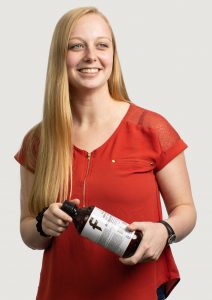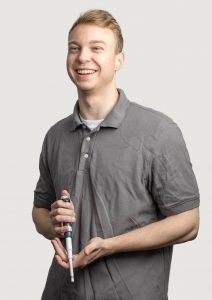Experience Matters
Through the generosity of alumni and friends, Lafayette students gain valuable opportunities to conduct research alongside faculty mentors on and off campus and at major research institutions. As a result of the Live Connected, Lead Change Campaign, many of these funds, some established before the campaign started, have been enhanced through individual and collective support, providing even greater opportunities to learn, establish relationships, build résumés, and expand Lafayette’s reputation as a national leader in undergraduate research.
Daisy Grace

Daisy Grace ’20
The Joseph A. Sherma Chemistry Research Fund has been providing stipends for students performing summer research for more than 10 years. It was created collectively by former students to honor the professor emeritus of chemistry, who taught at Lafayette from 1958 until his retirement in 2000. An iconic figure at Lafayette, Sherma, who still visits Hugel Hall every day to work with his research students, is known to be a patient but demanding role model.
The Sherma Fund was a godsend for Daisy Grace ’20 (chemistry), a first-generation student, who is working at University of North Dakota this summer, synthesizing biodegradable polymers from renewable resources to act as a substitute for petroleum-based, environmentally- persistent plastics.
Grace recently won a Goldwater Scholarship, which was awarded to just 496 college sophomores and juniors nationwide in math, computer sciences, engineering, and the natural sciences.
 “A research experience at an early stage of an undergraduate program can define a career path in the sciences. Dr. Sherma was the combination of teacher and researcher, a path he followed as an assistant/associate professor with teaching and research projects involving his undergraduates.”
“A research experience at an early stage of an undergraduate program can define a career path in the sciences. Dr. Sherma was the combination of teacher and researcher, a path he followed as an assistant/associate professor with teaching and research projects involving his undergraduates.”
John Labows ’63
Supporter of the Joseph A. Sherma Chemistry Research Fund
“My parents didn’t go to college, and they don’t have the most stable jobs,” she says. “My dad is in construction and has been diagnosed with lupus and is on disability; my mom works as a secretary. We didn’t have the funds to keep me here over the summer. The funding was the only way I was able to do research over the summer.”
 “We can teach students in the classroom, but it’s not really science. It’s not what they will be doing. It’s learning out of a book, which provides an answer. When you do research, there’s no answer yet. Student confidence is raised with research, heightening the excitement about their career paths.”
“We can teach students in the classroom, but it’s not really science. It’s not what they will be doing. It’s learning out of a book, which provides an answer. When you do research, there’s no answer yet. Student confidence is raised with research, heightening the excitement about their career paths.”
Melissa Galloway
Assistant Professor of Chemistry
She is studying atmospheric aerosols with Melissa Galloway, assistant professor of chemistry, specifically brown carbon, which is released when organic material, like wood, burns. As part of a National Science Foundation program, Grace is researching how quickly brown carbon breaks down with sunlight to understand its effect on climate change. She plans to attend graduate school and go into industry to design biodegradable polymers.
Those who continue to support programs such as the Sherma Fund understand how financial support makes a difference for students.
Nick Grams

Nick Grams ’19
The John F. and Dorothy M. Dorflinger Summer Research Endowment Fund provides resources to send four students interested in science or health-related fields off campus for summer internships with Lafayette alumni. The fund, endowed by Trustee Emeritus Laneta Dorflinger ’75 H’17 and her husband, Mark Graham, allows students to conduct research at graduate schools or in professional laboratories.
Nick Grams ’19 (biology) worked at Washington University in St. Louis during summer 2017, researching techniques for killing non-Hodgkin lymphoma cells.
“This type of research would not have been possible without the Dorflinger Fund because at the time, before hearing about the offer from Dr. Kurt, I don’t remember the biology department offering any sort of financial assistance or opportunities for off-campus research,” Grams says. “The Dorflinger Fund fully supported me. It paid for my housing, my food, and my travel. The experience wouldn’t have been possible without it.”
 “Thanks to Lafayette’s extraordinary mentoring in the basic sciences, I received a research fellowship at Brown. It opened my eyes to the excitement of a graduate laboratory at a first-tier university. My husband, Mark, and I created this fund to honor my parents while giving current students access to the same life-changing research opportunities I had.”
“Thanks to Lafayette’s extraordinary mentoring in the basic sciences, I received a research fellowship at Brown. It opened my eyes to the excitement of a graduate laboratory at a first-tier university. My husband, Mark, and I created this fund to honor my parents while giving current students access to the same life-changing research opportunities I had.”
Laneta Dorflinger ’75 H’17
He says his time at Washington University made him a better scientist.
“I learned a lot of techniques and used a lot of equipment,” Grams says. “I learned how to think as a critical independent mind. Maybe the most important thing that it showed me was that I really liked research and confirmed my desire to go to the University of Pennsylvania as a graduate student.”
 “The Dorflinger Fund provides opportunities for students to conduct research with Lafayette alumni and at the same time strengthens alumni relationships with the College. Not all alumni are able to help financially, but offering students these types of opportunities is just as valuable.”
“The Dorflinger Fund provides opportunities for students to conduct research with Lafayette alumni and at the same time strengthens alumni relationships with the College. Not all alumni are able to help financially, but offering students these types of opportunities is just as valuable.”
Robert Kurt
Gideon R. Kreider Jr. and Alice L. Kreider Professor of Biology
“It was a turning point in my career,” Grams says. “It defined my career path and where I want to be in the future. I will certainly never forget it.”